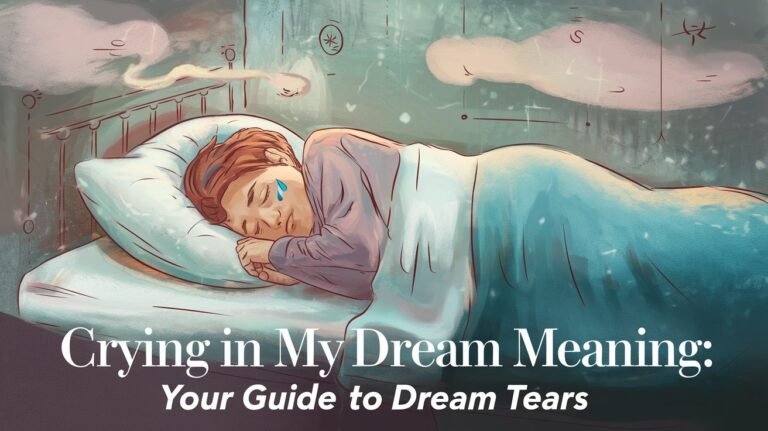Dreaming Crying Meaning: Why You Cry in Dreams & What It Reveals

Crying in dreams can be very meaningful. It often shows the feelings we keep hidden during the day. These tears can mean sadness, grief, stress, or anger.
Dreaming of crying can help us release these feelings. It’s a way to heal and grow emotionally.
Dreams let us peek into our subconscious mind. Crying in dreams might show unresolved trauma or a need to process past events. It can also mean we want to find emotional release.
The people and scenes in our dreams can help us understand our feelings and desires. By looking into the meaning of crying in dreams, we can learn more about ourselves. Whether the tears are happy, sad, or something in between, they show us the depths of our psyche.
The Psychology Behind Crying Dreams
Dreams are key in processing emotions while we sleep. Our subconscious mind brings up feelings we’ve kept hidden, leading to crying in dreams. Research shows that 85% of adults have cried in a dream, showing how common it is.
Emotional Processing During Sleep
Dreams help us deal with emotions we can’t face when awake. Crying in dreams lets us release built-up feelings. It’s a way to express emotions safely.
Crying over a loss in a dream often shows anxiety, even if the person is alive. This is a common theme in dreams.
Role of the Subconscious Mind
The subconscious mind shapes our dreams and their meanings. Dreams about crying strangers might mean we’re feeling let down or ready for a new start. It shows we’re looking at life differently.
Dreams where we cry for a short time can mean we’re happy and content in real life. Dream experts agree on this.
Connection to Daily Stress
Crying in dreams often relates to stress and unresolved issues in our lives. Dreams about comforting someone who cries might mean we need help or feel dishonest in our relationships. Experts say crying over small things can mean big changes or emotional shifts are coming.
Dreams where we cry over bad events show we’re struggling with real-life problems. Seeing animals or objects cry in dreams can mean we feel worthless or unheard. Understanding these dreams helps us uncover our subconscious thoughts and feelings, leading to better emotional health.
Types of Crying Dreams and Their Symbolism
Dreams about crying are quite interesting. They can show us a lot about our feelings and what’s going on inside us. Whether it’s tears over something unfair or not being able to stop crying, each dream has its own meaning.
Crying in a dream about a bad event might mean we’re holding onto feelings or need to stand up for what’s right. Not being able to stop crying could show we’re lacking confidence or need to let out our emotions. But, crying for just a little bit might mean we’re happy and at peace in real life.
Dreaming about crying over small things might mean we’re holding onto tiny issues that need to be dealt with. Seeing someone we don’t like crying could mean we’re angry or want to make up. Dreams about crying because we lost something or someone might show our deep fears and worries.
Dreams about crying are full of hidden messages from our subconscious. By understanding these dreams, we can learn more about our feelings, relationships, and personal growth. It’s a way to uncover what we need to heal and improve ourselves.
Physical Tears vs. Dream Tears: Understanding the Difference
While we sleep, our dreams can stir strong emotions, sometimes causing real tears. Physical tears after an emotionally charged dream show the deep link between dreams and emotions. The emotional impact of crying in dreams can be as deep as real-life crying, showing how sleep, dreams, and emotions are intertwined.
Real Tears During Sleep
People who wake up crying real tears may have uncovered deep grief or unresolved emotions in their dreams. The idea that “tears are better out than in” suggests that crying at night can be healing. It allows the release of feelings that were held back during the day.
Dream-induced Emotional Response
At times, people may hide their grief or struggle to express it, leading to crying in dreams. Dream symbols, like a young child or historical markers, can hint at the source of this grief. They guide individuals towards self-discovery and healing.
The practice of “dream alchemy” helps by comforting past selves or the symbolic child in the dream. It’s a powerful way to heal and move forward. Resources like Zoom consultations, books, podcasts, and online courses are also recommended for further exploration and healing.
Unresolved Trauma and Crying Dreams
Crying dreams often show unresolved trauma or hidden emotions. They help the subconscious deal with past traumas. These dreams hint at a need for healing and facing deep emotional issues.
Recurring crying dreams might mean ongoing struggles with past traumas. They might need attention and possibly professional help.
Dreams about crying can show a variety of emotions and experiences. Dream tears offer a safe space for emotional release. They can signal the need for emotional release due to stress or feeling overwhelmed.
Tears in dreams and waking life are powerful for healing and change. Seeing someone cry in a dream can make us feel empathy and connection. Dreaming of crying can mean shedding emotional burdens and getting ready for a spiritual breakthrough.
Keeping a dream journal can help find deeper messages in dreams. Waking up crying or feeling sad for no reason might mean touching on buried grief. Tears are seen as a healing process, possibly showing a release of grief.
Denying or suppressing grief can lead to deeper emotional wounds. Dreams might show past events causing grief, like a sad or hurt child. Using dream alchemy, like hugging and comforting oneself as a child, can help heal and move past past traumas.
Spiritual and Religious Interpretations of Crying Dreams
Crying in dreams holds deep spiritual and religious meanings across many faiths and cultures. It’s seen as a way to release emotions, repent, or call for divine help.
Cultural Perspectives
Different cultures see crying dreams in unique ways. In Islam, they might signal a time to reflect on sins and ask for forgiveness. Eastern spiritual practices link crying dreams to emotional cleansing and enlightenment.
Indigenous cultures see dream tears as a bridge to the supernatural world. They believe it’s a call for healing.
Religious Symbolism
In the Judeo-Christian tradition, crying dreams have deep biblical meanings. They are seen as a way to talk to God, showing deep emotions, repentance, or a need for guidance. Crying in dreams can mean mourning, loss, seeking comfort, or a desire for spiritual renewal.
Today, many Christians believe dreams are spiritually significant. They see them as a way for God to communicate, following biblical teachings. Emanuel Swedenborg, a scientist, shared his spiritual awakening through dreams, including crying ones, which showed him a deep connection with the divine.
The spiritual and religious views of crying dreams highlight the deep emotional and subconscious parts of us. They offer insights into personal growth, healing, and finding a higher purpose.
Common Scenarios of Crying in Dreams
Dreaming about crying is quite common. Experts say it means different things based on the dream’s context and feelings. They’ve found several common scenarios where crying shows up in dreams. Each one gives a peek into the dreamer’s emotional state and hidden thoughts.
Dreaming of crying over lost loved ones is a common one. It might show the dreamer’s worry or fear of losing someone close. Seeing others cry in dreams can mean the dreamer wants to help or comfort them. These dreams highlight the dreamer’s empathy and emotional smarts.
Dreams about crying over small things might point to stress from everyday issues. The dream world helps the subconscious mind deal with and let go of these feelings. Dreams of fake crying or pretending to cry could mean the dreamer is too emotional in real life.
Whether it’s about lost loved ones, helping others, or dealing with stress, crying in dreams is about emotional processing and dream interpretation. Figuring out the meaning behind these dreams can offer deep insights into the dreamer’s mental health and personal growth.
Crying Dreams and Their Connection to Mental Health
Dreaming is a complex and fascinating part of our minds. Crying dreams often show our emotional state. They might signal mental health issues like depression or anxiety.
Depression Indicators
Recurring crying dreams can be a sign of depression. They might show a struggle with sadness or hopelessness. Paying attention to these dreams can help us understand our mental state.
It can also show the need for professional help or self-care. This way, we can address our mental health concerns.
Anxiety Manifestations
Crying dreams can also show anxiety. Our subconscious mind expresses emotional turmoil through these dreams. They might be caused by stress, trauma, or worry.
Seeing the link between crying dreams and anxiety helps us cope better. It encourages us to seek support from mental health experts. This way, we can manage our anxiety effectively.
Understanding crying dreams and mental health is key to improving our well-being. Getting help from a sleep psychology expert or mental health professional is invaluable. They can guide us through these emotional journeys in our dreams.
Scientific Research on Emotional Dreams
Scientists have studied the role of emotions in dreams, focusing on crying and other intense feelings. They found that dreams with tears are key in processing our daily lives and managing our mood.
Research shows that REM sleep is vital for emotional memory and stress relief. In this stage, the brain’s emotional center stays active. This allows us to deal with emotional issues and find relief through our dreams.
Studies in sleep psychology link emotional dreams to mental health. Dreams with crying or laughter might signal health issues, like breathing problems or tiredness. These dreams could be signs of healing, showing our body’s strength and our mind’s efforts to handle challenges.




